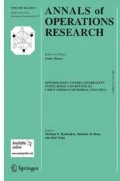Abstract
We study scheduling as a means to address the increasing energy concerns in manufacturing enterprises. In particular, we consider a flow shop scheduling problem with a restriction on peak power consumption, in addition to the traditional time-based objectives. We investigate both mathematical programming and combinatorial approaches to this scheduling problem, and test our approaches with instances arising from the manufacturing of cast iron plates.







Similar content being viewed by others
References
Albers, S. (2010). Energy-efficient algorithms. Communications of the ACM, 53(5), 86–96.
Babu, C. A., & Ashok, S. (2008). Peak load management in electrolytic process industries. IEEE Transactions on Power Systems, 23(2), 399–405.
Bansal, N., Kimbrel, T., & Pruhs, K. (2007). Speed scaling to manage energy and temperature. Journal of the ACM, 54(1), 1–39.
Bansal, N., Chan, H. L., & Pruhs, K. (2009). Speed scaling with an arbitrary power function. In Proceedings of the 20th annual ACM-SIAM symposium on discrete algorithms (pp. 693–701).
Bouzid, W. (2005). Cutting parameter optimization to minimize production time in high speed turning. Journal of Materials Processing Technology, 161(3), 388–395.
Cochran, R., Hankendi, C., Coskun, A., & Reda, S. (2011). Pack & cap: adaptive DVFS and thread packing under power caps. In Proceedings of the 44th annual IEEE/ACM international symposium on microarchitecture.
Dahmus, J. B., & Gutowski, T. G. (2004). An environmental analysis of machining. In ASME 2004 international mechanical engineering congress and exposition (pp. 643–652).
Demidenko, V. M. (1979). The traveling salesman problem with asymmetric matrices. Izvestiâ Akademii Nauk BSSR. Seriâ Fiziko-Matematičeskih Nauk, 1, 29–35 (in Russian).
Drake, R., Yildirim, M. B., Twomey, J., Whitman, L., Ahmad, J., & Lodhia, P. (2006). Data collection framework on energy consumption in manufacturing. In IIE annual conference and expo 2006.
Fang, K., Uhan, N. A., Zhao, F., & Sutherland, J. W. (2011). A new approach to scheduling in manufacturing for power consumption and carbon footprint reduction. Journal of Manufacturing Systems, 30(4), 234–240.
Felter, W., Rajamani, K., Keller, T., & Rusu, C. (2005). A performance-conserving approach for reducing peak power consumption in server systems. In Proceedings of the 19th annual international conference on supercomputing (pp. 293–302).
Garey, M. R., Johnson, D. S., & Sethi, R. (1976). The complexity of flowshop and jobshop scheduling. Mathematics of Operations Research, 1(2), 117–129.
Gutowski, T., Murphy, C., Allen, D., Bauer, D., Bras, B., Piwonka, T., Sheng, P., Sutherland, J., Thurston, D., & Wolff, E. (2005). Environmentally benign manufacturing: observations from Japan, Europe and the United States. Journal of Cleaner Production, 13, 1–17.
Irani, S., & Pruhs, K. R. (2005). Algorithmic problems in power management. SIGACT News, 36(2), 63–76.
Keha, A. B., Khowala, K., & Fowler, J. W. (2009). Mixed integer programming formulations for single machine scheduling problems. Computers & Industrial Engineering, 56(1), 357–367.
Kontorinis, V., Shayan, A., Tullsen, D. M., & Kumar, R. (2009). Reducing peak power with a table-driven adaptive processor core. In Proceedings of the 42nd annual IEEE/ACM international symposium on microarchitecture (pp. 189–200).
Kwon, W. C., & Kim, T. (2005). Optimal voltage allocation techniques for dynamically variable voltage processors. ACM Transactions on Embedded Computing Systems, 4(1), 211–230.
Lasserre, J. B., & Queyranne, M. (1992). Generic scheduling polyhedra and a new mixed-integer formulation for single-machine scheduling. In Proceedings of the 2nd integer programming and combinatorial optimization conference (pp. 136–149).
Manne, A. S. (1960). On the job-shop scheduling problem. Operations Research, 8(2), 219–223.
Mouzon, G., & Yildirim, M. B. (2008). A framework to minimise total energy consumption and total tardiness on a single machine. International Journal of Sustainable Engineering, 1(2), 105–116.
Mouzon, G., Yildirim, M. B., & Twomey, J. (2007). Operational methods for minimization of energy consumption of manufacturing equipment. International Journal of Production Research, 45(18–19), 4247–4271.
Mudge, T. (2001). Power: a first-class architectural design constraint. Computer, 34(4), 52–58.
Oberg, E., Jones, F. D., Horton, H. L., & Ryffel, H. H. (2008). Machinery’s handbook (28th ed.). New York: Industrial Press.
Reddi, S. S., & Ramamoorthy, C. V. (1972). On the flow-shop sequencing problem with no wait in process. Operational Research Quarterly, 23(3), 323–331.
Stafford, E. F. Jr., Tseng, F. T., & Gupta, J. N. D. (2005). Comparative evaluation of MILP flowshop models. Journal of the Operational Research Society, 56, 88–101.
Thörnblad, K., Strömberg, A. B., & Patriksson, M. (2010). Optimization of schedules for a multitask production cell. In The 22nd annual NOFOMA conference proceedings.
Unlu, Y., & Mason, S. J. (2010). Evaluation of mixed integer programming formulations for non-preemptive parallel machine scheduling problems. Computers & Industrial Engineering, 58(4), 785–800.
Wagner, H. M. (1959). An integer linear-programming model for machine scheduling. Naval Research Logistics Quarterly, 6(2), 134–140.
Yao, F., Demers, A., & Shenker, S. (1995). A scheduling model for reduced CPU energy. In Proceedings of the 36th annual symposium on foundations of computer science (pp. 374–382).
Author information
Authors and Affiliations
Corresponding author
Rights and permissions
About this article
Cite this article
Fang, K., Uhan, N.A., Zhao, F. et al. Flow shop scheduling with peak power consumption constraints. Ann Oper Res 206, 115–145 (2013). https://doi.org/10.1007/s10479-012-1294-z
Published:
Issue Date:
DOI: https://doi.org/10.1007/s10479-012-1294-z




